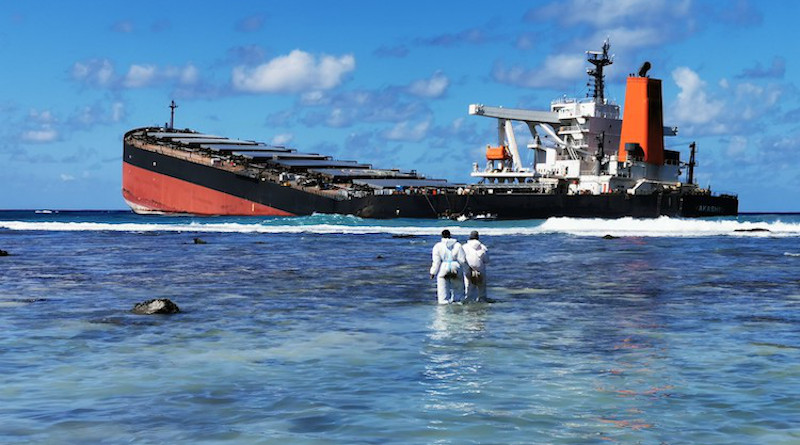Legal Loopholes May Deny Mauritius Much-Needed Oil Spill Clean-Up Funds
By IDN
By Lisa Vives
Just over a month since a cracked shipping vessel leaked over a thousand tons of dirty oil, blanketing the pristine sands of the East African island of Mauritius, authorities have now arrested the ship’s captain for unsafe navigation. He faces a sentence of 60 years if found guilty.
It’s been an environmental nightmare for the tourist destination whose lagoons, lush tropical jungles and mountains attract millions of visitors every year. Some 39 dolphins have been found dead since the Japanese-owned ship struck a coral reef on July 25.
“This is a deeply sad and alarming day for the people of Mauritius and for its singular biodiversity,” Happy Khambule, a senior climate and energy campaign manager at Greenpeace Africa, said in a statement on August 26. He said that Greenpeace had urged the authorities to “carry out a swift, transparent and public autopsy on the bodies collected.”
Mauritius says it will seek compensation for the leak from “the owner and the insurer” and the Japanese firm Nagashiki Shipping has pledged to respond to requests for compensation. Police said crew members questioned as part of their investigation informed them there had been a birthday party on the ship the day it ran aground.
As UNCTAD, the main UN body dealing with trade, investment and development issues points out, small island nations face an existential and developmental threat from ship-source pollution endangering their vulnerable marine ecosystems and ocean economies. Often close to world shipping lanes, they are at particular risk from oil spills.
Yet several loopholes in the international legal conventions that ensure compensation to the injured nation may leave Mauritius without sufficient funds to fully recover. The ship that ran aground, for example, is a bulk carrier, not an oil tanker, and is governed by a different convention with lower liability.
In the case of the MV Wakashio, the maximum compensation for economic losses and to repair the environment would be about $65.17 million. If it were an oil tanker, Mauritius could have recouped up to $286 million.
Other loopholes deny Mauritius even higher compensation up to a maximum of $1.05 billion per incident because the applicable protocol was not ratified by Mauritius while another loophole involves an oil pollution emergency plan with provisions for technical operations. Mauritius and Japan are state parties to this convention, but a third party, Panama, is not.
The MV Wakashio, a Japanese-owned and Panamanian-flagged bulk-carrier, was sailing without cargo when it grounded on a coral reef on July 25 in an environmentally sensitive and biodiverse area off the east coast of Mauritius. The cause is still unknown.
At the time of the grounding, the ship reportedly contained approximately 3,894 tons of fuel oil, 207 tons of diesel and 90 tons of lubricant oil on board.
UNCTAD commented: The devastating oil spill off the coast of Mauritius highlights the need for global adoption of international laws that govern the seas and protect small island states and their vulnerable marine ecosystems against ship pollution.
“There’s a need for universal participation in the existing international legal framework, where all nations are party to agreements, so when incidents like this occur, vulnerable countries are protected,” said Shamika N. Sirimanne, UNCTAD’s technology and logistics director.
She said such oil spills herald negative environmental and socio-economic consequences for developing countries, especially small island developing states (SIDS).
Ms. Sirimanne added: “Sustainable Development Goal 14 calls on us to protect life below water and this means minimizing pollution at every possible turn, including putting all necessary precautions in place to manage environmental disasters when they do happen.”

